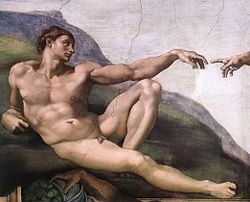
Back Адам Abkhazian Adam Afrikaans آدم Arabic ܐܕܡ ARC آدم ARY ادم ARZ আদম Assamese Adán AST Адам авараг AV Adəm Azerbaijani
Adam | |||||||||||||||||
|---|---|---|---|---|---|---|---|---|---|---|---|---|---|---|---|---|---|
 | |||||||||||||||||
| Era | Edenic and Antediluvian | ||||||||||||||||
| Spouse | Eve[a] | ||||||||||||||||
| Children | Cain, Abel and Seth[b] | ||||||||||||||||
| |||||||||||||||||
Adam[c] is the name given in Genesis 1–5 to the first human.[4] Adam is the first human-being aware of God, and features as such in various belief systems (including Judaism, Christianity, Gnosticism and Islam).[5]
According to Christianity, Adam sinned in the Garden of Eden by eating from the tree of the knowledge of good and evil. This action introduced death and sin into the world. This sinful nature infected all his descendants, and led humanity to be expelled from the Garden. Only through the crucifixion of Jesus, humanity can be redeemed.
In Islam, Adam is considered Khalifa (خليفة) (successor) on earth. This is understood to mean either that he is God's deputy, the initiation of a new cycle of sentient life on earth, or both.[6] Similar to the Biblical account, the Quran has Adam placed in a garden where he sins by taking from the Tree of Immortality, so loses his abode in the garden. When Adam repents from his sin, he is forgiven by God. This is seen as a guidance for human-life, who sin, become aware of their mistake, and repent.[7]
In Gnostic belief-systems, the bodily creation of Adam is viewed in a negative light.[8] Due to the underlying demonization of matter, Gnostic cosmologies depict the body as a form of prison of Adam's soul. This soul would have been transferred by Sophia (wisdom) onto the creator (Demiurge) of the material world, who in turn is tricked into blowing the soul into a body.
Cite error: There are <ref group=lower-alpha> tags or {{efn}} templates on this page, but the references will not show without a {{reflist|group=lower-alpha}} template or {{notelist}} template (see the help page).
- ^ Hitti, Philip K. (1928). The Origins of the Druze People and Religion: With Extracts from Their Sacred Writings. Library of Alexandria. p. 37. ISBN 978-1-4655-4662-3.
- ^ Dana, Nissim (2008). The Druze in the Middle East: Their Faith, Leadership, Identity and Status. Michigan University press. p. 17. ISBN 978-1-903900-36-9.
- ^ The Slaves of the Immaculate Heart of Mary (24 December 2000). "Saint Adam and Saint Eve (First Age of the world)". Catholicism.org. Retrieved 22 December 2021.
- ^ Hendel 2000, p. 18.
- ^ Chipman, Leigh NB. "Mythic Aspects of the Process of Adam's Creation in Judaism and Islam." Studia Islamica (2001): 5-25.
- ^ Mahmoud Ayoub The Qur'an and Its Interpreters, Volume 1 SUNY Press, 1984 ISBN 978-0-87395-727-4 p. 73
- ^ Stieglecker, H. (1962). Die Glaubenslehren des Islam. Deutschland: F. Schöningh
- ^ Chipman, Leigh NB. "Mythic Aspects of the Process of Adam's Creation in Judaism and Islam." Studia Islamica (2001): 5-25.